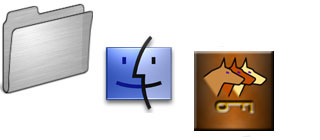 ![[Header]](../XuShared2/Line3.jpeg)

(Up to OJB's Mac Tips List Page)
Mac OS X SpeedSome people find Mac OS X can be slow on their computer. X is certainly more demanding than most other systems, but there is quite a lot you can do to improve its general performance.
First look at what type of Mac you have. X will never be very fast on a machine slower than 400 MHz and without a modern graphics accelerator. If you have a slower Mac there is still a certain amount you can do but you will probably need to get used to working at a slightly slower pace!
No matter what type of Mac you have its important to have enough memory. Mac OS X uses a lot of memory, especially for its amazing graphics effects. The average user should be able to manage with 256MB (with Mac OS X 10.4 Tiger, 512 is probably a better base amount), but 512MB is probably a lot better and 1GB or more should be considered for power users!
Mac OS X uses the disk a lot so a fast hard disk is useful. Hard disks can gain speed using various techniques: faster spin rates (7200 rpm instead of 4200 or 5400), bigger caches (a few megs) and fast head positioning mechanisms are all useful. Note that because of space and power requirements its hard to get high performance drives for laptops.
Next, have a look at what programs you are running. Most importantly, replace all your Classic (Mac OS 9 and before) programs with "native" Mac OS X versions so you don't have to run the Classic environment. If you do need to use Classic occasionally, shut it down when you are finished. If you have an Intel based machine you will find software designed for that processor will be much faster than older programs running in the compatibility environment, Rosetta.
Finally, use appropriate programs. Some programs are much faster than others, so use the ones which are faster where possible. Notable examples of this are: Safari replacing Internet Explorer, Preview replacing Acrobat Reader, AppleWorks replacing Microsoft Office. Note that there are situations when you might need to use the slower program (for compatibility reasons) so don't throw them away, just change the default program for different file types using the Mac OS X Finder.
![[Up]](../XuShared/Up2B.jpeg)
|

![[Up]](../XuShared/Up2B.jpeg)

![[Up]](../XuShared/Up2B.jpeg)